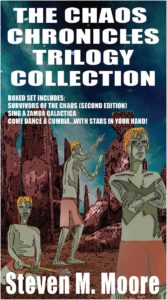I’m not Dr. Asimov…
Before I get into the subject of this article, let me wish everyone a wonderful and safe Thanksgiving. We tend to lose the meaning of this holiday that leads into the commercial end-of-year rush, starting with Black Friday…or earlier! It should be a time for personal contemplation about having family and friends and to give thanks for what we have in our lives. It’s not political or commercial but spiritual, a time to recognize our common humanity, something we share independently of political proclivities, religious preferences, or sexual orientation. We are all on spaceship Earth together, and we have a lot to be thankful for. Now, to the article….
While the sci-fi master Isaac Asimov certainly motivated me to write sci-fi—I read his first robot novel Caves of Steel at age twelve—I’m not Dr. Asimov. The ex-biochemist was also a master at writing popular science books that explained current science. I’ve failed miserably at that! A few blog posts, but not one book.
Like him, I’m a fan of Science News. Scientists are now super specialized in general, so we have to turn to more popular works like anyone else to see what other scientists are doing. I think both Isaac and I had that in common—we kept up with general scientific and technology progress in spite of our specializations. But the sci-fi master was already a generalist with many popular science books to prove it.
Of course, those books were also a respite from his sci-fi writing. His Foundation series is evidence for that. He wrote the Foundation trilogy, robot novels, and End of Eternity, and then he took a vacation of several decades to write all those popular science books. After that period, he returned to sci-fi and completed the Foundation series, bringing all those earlier novels together and continuing to write more, creating a masterful oeuvre the likes of which will never be seen again.
“Decades” is the key word. Like King and other famous genre fiction writers, Isaac Asimov got an early start. That’s difficult to do nowadays. I won’t complete two publishing decades until 2026…if I make it that far.
I’ve been tempted to write a few popular science books, but so much in that area is available now. In short, there’s no lack of authors and books explaining science. There’s also an apathy among readers who might otherwise read such books. Most people no longer care how things work; they just use the science and technology without thinking about it. There’s some interest in space science and astrophysics beyond sensationalism and controversy (is Pluto a planet?), but there’s also a societal disease where people think science is just belief and it’s responsible for society’s woes. And then there are the naysayers, deniers of global warming and climate change, or believers that the world was made 6000 years ago when humans were contemporaries of the dinosaurs (those fossils came from Noah’s flood, don’t you know?).
I would have a hard time channeling Dr. Asimov in such a toxic anti-science environment. True science is secular, but we’re becoming a belief-based society, even though the beliefs contradict facts. In one of the first Foundation books, there’s a scene where the principal confronts an archaeologist, telling him to prove his assertions by going out and digging up the evidence. The “scientist” refuses, saying that theories (his beliefs) are enough. Our scientists today haven’t gone to those extremes, but many in society have, denying scientific evidence while creating their own “theories” (intelligent design is the perfect example of an oxymoron, because the people who champion this belief ignore facts).
No, I’m not about to hit my head my head against the brick wall of public opinion. Let’s face it: it’s a lot more fun to write fiction that includes or extrapolates current scientific knowledge, allowing astute readers to see the possibilities in a fictional context. I just hope that my stories are enough to make Dr. Asimov happy. One can popularize science in many ways—mine are just a bit different than some of the old master’s.
***
Comments are always welcome.

Evergreen Series: “The Chaos Chronicles Trilogy.” Survivors of the Chaos starts with a dystopian Earth controlled by multinationals and their mercenaries, and ends with an expedition to the 82 Eridani star system. Sing a Zamba Galactica begins with first contact where Humans meet the strange ETs they name Rangers, and ends with a mercy mission where Humans convince one strange collective intelligence to cure another. In Come Dance a Cumbia…with Stars in Your Hand!, a Human industrialist is bent on controlling near-Earth planets in the Galaxy, and Humans and their ET friends must try to stop him. Centuries of development in near-Earth space are covered in these novels, all three evergreen books; sci-fi is always current! And all three novels are contained in the ebook bundle, The Chaos Chronicles Trilogy Collection, a bargain you can find wherever fine ebooks are sold.
Around the world and to the stars! In libris libertas!

December 2nd, 2019 at 2:19 pm
Combining science and fiction makes for fascinating, intelligent writing and reading. Congrats on your novels.
December 4th, 2019 at 6:38 am
Jacqueline,
Yes, the combos seem to work well–science and fiction, history and fiction, art and fiction, etc. I seem to dabble in all of them.
Thanks for the congrats. That means a lot.
r/Steve
PS. Jacqueline has her own blog and is a good writer. Check out her books.